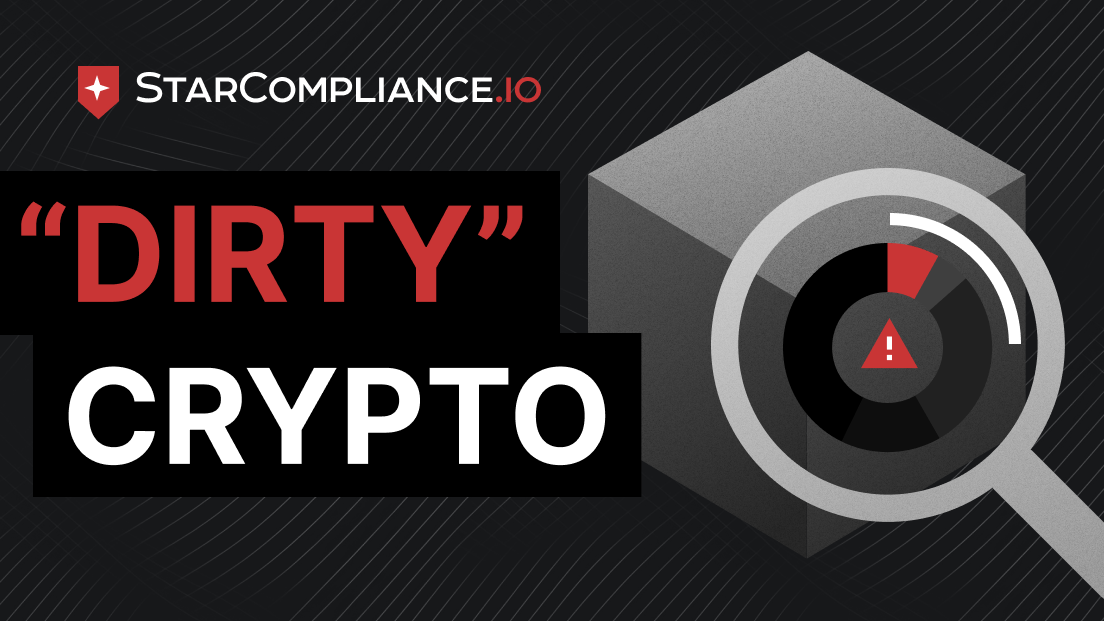
How to check account for dirty crypto?
2022-11-28
Optional: How to avoid being sentenced for 10 years for dirty crypto
How to check your account for dirty crypto
Crypto becomes “dirty” the moment it is involved with one of thousand scam-labeled wallets. It’s usually hard to detect by yourself, and might cause crypto-exchange to ban your account or even seize “innocent” funds. But there’s a way to check yourself for “dirty” crypto and avoid being scammed.
Fast facts about “dirty” part of the crypto
1. 43% of all BTC transactions involve crime, they are still in circulation
2. Dirty coins can be identified with AML checks
3. Our tracing software allow to track “dirty” crypto and perform AML checks

What is a dirty crypto and how do you get one?
Coin is considered “dirty” when it is used to commit a crime
- Wallet or exchange hack;
- Money laundering, attempts to hide the flow of money by swapping it for crypto. (spoiler alert: it won’t work);
- Fraud, like dApps or smart-contracts which steal your crypto
- When coins are involved with darknet shops of any kind: drugs, slaves, weapons, organs, etc
- Special attention is paid for coins used to purchase stolen credit card details, personal ID’s, stolen databases.
You identify dirty coins with an AML check. Note, that coin can be dirty even if it is not directly derived from an illegal or fraudulent wallet. For example, BTC coming from unregistered exchanges or mixing services will be flagged “dirty” by any AML software.
Risks of having dirty coins in your wallet
You don’t suspect having a dirty coin until it’s too late. If you’ve been trading long enough, using different payment methods, exchangers or even if you just started – it doesn’t matter. When you have that trading account charged with money the least you want is a dirty crypto.
Here are some possible consequences of not doing an AML check
- You won’t be able to sell coins at the current market price. Exchanges that don’t want to mess with AML regulators will not convert suspect coins into U.S. dollars and other fiat currency. To sell dirty tokens, you will have to use a peer-to-peer (P2P) platform or a secondary exchanger, which will charge a higher fee. Usually, dirty BTC is sold with a 10% to 20% discount, because they can’t be directly used in a “clean” environment.
- You won’t be able to trade. Most major exchanges — and all regulated ones — use special software to track dirty crypto. Once you try to deposit suspicious coins, the exchange will block any transactions for you until evidence or explanation on the origin of the coins is provided.
- You lose your crypto. In order to comply with AML regulations, exchangers have to act swiftly and with full paranoia. For example, if you fail to explain and provide documentation on where those coins came from, the exchange will not only permanently block your account, but will not allow you to withdraw any coins from your balance.
- Cyberpolice might get involved. Exchanges are forced to report any evidence of a crime to the financial police, who will probably want to question you. Even if you can prove you didn’t commit the crime your bitcoins were involved in, you’ll still lose the coins because the proceeds of crime are usually confiscated.
- Serious problems with the law. In the worst case scenario, you could be prosecuted as an accessory or co-conspirator in a financial crime. Depending on the state, country of your residence and local laws, the average term of sentence by these two charges are between 10 to 30 years.
How does AML software detect dirty crypto?
Anonymity and privacy are two benefits of cryptography people admire. Bitcoin is anonymous in the sense that you don’t have to enter your name and ID data when creating a wallet. However, bitcoin is also well traceable – every transaction leaves a digital trail that can be tracked. You can track most coins easily, except for privacy-oriented coins such as Monero (XMR), although even those are not secure.
If you are wondering if you can verify the origin of the coins you receive on your own, without the use of special anti-money laundering software, the answer is no. You can do your own research with a blockchain explorer like BTC.com or Etherscan to see a list of all transactions associated with the wallet address that sent you the coins. However, specialized software keeps track of every wallet involved with criminal activity, suspected to be associated or even used as a relay wallet.
Special tracking tools we are able to use to detect whether crypto is dirty or not
- Chainalysis Reactor
- Coinpath
- Elliptic
- AnChain.AI
- CipherTrace
- Crystal Blockchain
- Uppsala Security
Keep in mind that these tools do not reveal the person behind the addresses. In addition, criminals usually use dozens or hundreds of fake wallets to cover their tracks, so you will need significant computing power and special algorithms to track them. In fact, blockchain analysis software is a rapidly growing industry, because this is a never ending arms race of tracing.
If you have doubt about origin of your crypto, we can
- Trace its origins from the moment it was minted, mined or otherwise created
- Analyze is any of the crypto you received during recent deals may be involved with criminal activity
- Provide you with detailed report on the origin of your funds, which counts as legal evidence provided by third party experts
- Even if exchangers won’t believe this report somehow, our lawyers explain them everything